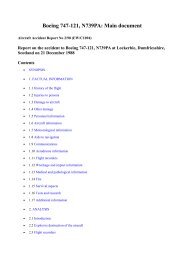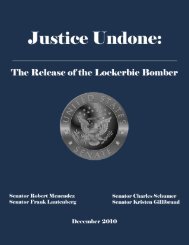REPORT OF THE - Archives - Syracuse University
REPORT OF THE - Archives - Syracuse University
REPORT OF THE - Archives - Syracuse University
Create successful ePaper yourself
Turn your PDF publications into a flip-book with our unique Google optimized e-Paper software.
must obtain permission to inspect abroad and announce their visits in advance. They are<br />
generally not free to roam the secure parts of the airport at will. In the past, FAA<br />
inspectors have not tested, observed or evaluated airports' security systems, out of respect<br />
for sovereignty and to retain the good will of foreign airport and host government<br />
officials.<br />
The General Accounting Office testified before the Commission's December 18, 1989<br />
hearing on the crucial need for this evaluation. Kenneth M. Mead, Director,<br />
Transportation Issues, of the Resources, Community and Economic Development<br />
Division, stated:<br />
By not verifying the adequacy of security controls and systems at domestic and foreign<br />
airports, FAA inspectors did not provide a true and complete assessment of the overall<br />
level of security on inspection reports ... We recommended that the foreign airport<br />
assessment process be strengthened by making analyses of host country security<br />
evaluations, including observing and evaluating host country testing, to assess the<br />
operational effectiveness of various security measures. FAA agreed with our<br />
recommendation and told us they plan to begin evaluating security testing at foreign<br />
airports in 1990. [Note 2]<br />
FAA initiated the program in January 1990.<br />
U.S. Carriers Caught in the Middle<br />
U.S. carriers are private entities required under U.S. regulations to conduct their own<br />
security screening. In Europe, the U.S. carriers find themselves caught between the<br />
requirements of FAA, exercising the sovereign right of the United States to protect its<br />
passengers and planes, and the sovereign host government, which already has in place<br />
what it believes to be adequate screening procedures. The FAA-required additional<br />
screening procedures described earlier cause legal and logistical problems between the<br />
carriers and the host government, which the Commission believes should more<br />
appropriately be resolved by the State Department at the government-to-government<br />
level.<br />
Timothy R. Thornton, Executive Vice President and General Counsel for Northwest<br />
Airlines, described the problem succinctly at the Commission's April 4, 1990, hearing:<br />
We had a dispute with a foreign government that went on for six months, where we were<br />
out of compliance with the FAA mandate as it related to extraordinary X-ray security of<br />
all checked baggage. [The foreign government] told us not to do it and the federal<br />
government told us to do it. Sometimes we were in violation of American laws.<br />
Sometimes we were in violation of the foreign laws of the airport where we operated. We<br />
were in the middle. Finally we got some help from the Federal Government but, for six<br />
months, it was whose jail did we want to go to. [Note 3]<br />
In France, until passage of new legislation in mid-1989, it was illegal for anyone but a<br />
government employee to search people and their belongings. France agreed to "look the<br />
other way" as U.S. carriers or their private contract security companies conducted<br />
searches. The applicable provision of the new French law has not yet been implemented,<br />
as inter-agency discussions continue over its implications for French civil rights. Even<br />
when the law finally becomes effective, searches by private companies will be subject to<br />
supervision by the French Ministry of Justice, and will need authorization by the U.S.<br />
Attorney General.










